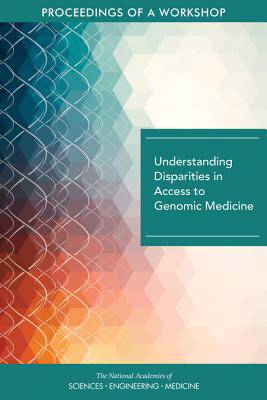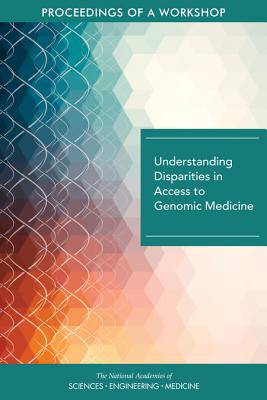
- Retrait gratuit dans votre magasin Club
- 7.000.000 titres dans notre catalogue
- Payer en toute sécurité
- Toujours un magasin près de chez vous
- Retrait gratuit dans votre magasin Club
- 7.000.0000 titres dans notre catalogue
- Payer en toute sécurité
- Toujours un magasin près de chez vous
Understanding Disparities in Access to Genomic Medicine
Proceedings of a Workshop
National Academies of Sciences Engineering and Medicine, Health and Medicine Division, Board on Health Sciences Policy, Roundtable on Genomics and Precision HealthDescription
Genomic medicine is defined as the routine use of genomic information about an individual as part of his or her clinical care as well as the health outcomes and policy implications of that clinical use. It is one approach that has the potential to improve the quality of health care by allowing practitioners to tailor prevention, diagnostic, and treatment strategies to individual patients. In recent years, research breakthroughs, technological advances, and the decreasing cost of DNA sequencing have led to the wider adoption of genomic medicine. However, as with the introduction of new technologies into health care, there are concerns that genetic and genomic testing and services will not reach all segments of the population both now and in the near future, and there remains a gap in knowledge regarding potential health care disparities in genomic medicine and precision health approaches.
On June 27, 2018, the National Academies of Sciences, Engineering, and Medicine hosted a public workshop to examine the gaps in knowledge related to access to genomic medicine and to discuss health care disparities and possible approaches to overcoming the disparate use of genomic medicine among populations. Workshop participants discussed research on access to genetics and genomics services in medically underserved areas, model programs of care for diverse patient populations, and current challenges and possible best practices for alleviating health care disparities as they relate to genomics-based approaches. This publication summarizes the presentations and discussions from the workshop.
Spécifications
Parties prenantes
- Auteur(s) :
- Editeur:
Contenu
- Nombre de pages :
- 126
- Langue:
- Anglais
Caractéristiques
- EAN:
- 9780309485258
- Date de parution :
- 28-01-19
- Format:
- Livre broché
- Format numérique:
- Trade paperback (VS)
- Dimensions :
- 160 mm x 239 mm
- Poids :
- 204 g

Les avis
Nous publions uniquement les avis qui respectent les conditions requises. Consultez nos conditions pour les avis.






